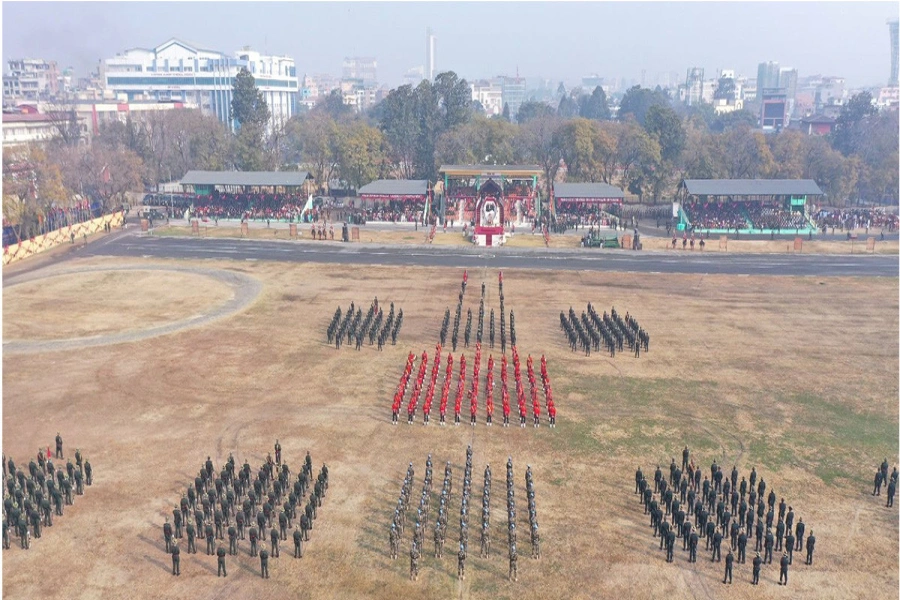The best frameworks for advancing socially impactful research can be created at the intersection of the grassroots efforts and institutional programs.
At the end of an intensive two-day training on semester-based teaching organized by Tribhuvan University in Nagarkot last May, we asked the seventy or so university faculty members from around the country to pick between two groups. One group was asked to strategize how to institutionalize the teaching excellence training, building on a few years of work done mainly online by a grassroots initiative. The other group would discuss a new topic: how to pursue and promote research and publication in the university. To our pleasant surprise, over two-thirds of the participants went to the research group. We had to come up with a quick way to better regroup the scholars.
We have observed increasing numbers of training and discussions that focus on research, writing, and publication in and beyond our universities in recent years. It is not just that the current lockdown has afforded more time to university professionals. The current trend builds on a strong momentum that we have seen in the last few years, in both the public and private institutions, in the capital and across the country. The incident above was a manifestation of a broader momentum.
Even better, we have observed an increased interest in making research and publication more socially impactful, especially among younger scholars. A recent article about UGC-supported grants showed that while the quality of our research and publications remain concerning, younger researchers are publishing stronger scholarship.
In this essay, we highlight two complementary dimensions for advancing research and publication for greater social impact: a community and culture of research and a policy framework that can foster the culture. The proposed framework would provide incentives to scholars, as well as realigning institutional priorities and accountability mechanisms, for making academic research more driven by social needs.
A condition for social impact
Within the emerging environment we highlighted above, scholars are eager to contribute to socially impactful knowledge production. This environment is a necessary and complementary condition for the framework that we propose below. So, let us first unpack how community can and must undergird institutional frameworks for advancing research, especially if research has to be driven by a social mission.
From our experience of organizing research and writing support programs across Nepal and across South Asia, we have learned that grassroots initiatives carry tremendous potential for promoting a local-first culture of research. When scholars work in groups, they develop confidence in their research agenda and projects, focus more on the process, and support one another toward better product. For example, in a recently completed writing support group program, a young public health researcher used mentor support to effectively present data on overweight issues among Nepali women, countering prevalent global assumptions about women in the developing world as only having underweight issues due to malnutrition. Another young Nepali scholar used peer feedback to reframe her article on potatoes for an international journal by showing the significance of her study about growth, yield, and quality of potato grown in Bhaktapur for both the local context and beyond. A Bangladeshi scholar worked with a Nepali scholar as she assessed the role of language teaching on the development of students’ academic skills more broadly. Even the entomologist in the group contributed to the global database of ant species by studying new species found in Nepal.
Only 8 pc hospital & research centers conduct research

Putting the local first requires a vision, as well as skills and confidence, all of which community and collaboration can best bolster. Scholars do the best research and writing when their work is grounded in the context/society they know best about, where they are likely to find research agendas they care most about. And, when there is a community of support and mentorship in that same context and around similar issues, emerging scholars are far more motivated and confident as researchers and writers.
Grassroots support initiatives like the above are also greatly aided by emerging technologies, highlighting the importance of community and collaboration again. For instance, video-conferencing has allowed practical workshops and peer interactions. Cloud-based word processing has greatly improved collaborative drafting and mentor feedback. Indeed, we are using both methods for drafting this essay on Google Doc, while talking on Zoom between New York and Chitwan. Connection, collaboration, and community—which emerging technology facilitates and enhances—are elements of the new condition or culture that new institutional frameworks build upon and mobilize.
Technology is vastly increasing our access to published scholarship and creating new modes of publication and dissemination of scholarship. But for advancing research with social impact, institutions must tap into and foster grassroots initiatives. When the pandemic is over, institutions must channel the momentum that was boosted by technology-mediated collaborative research and writing.
Universities have implemented research-intensive graduate programs, including the MPhil and the course-based PhD. In fact, there is a productive pressure on scholars of all ages and backgrounds to pursue research. It is not clear, however, if their leaders have thought through the need to promote research that adds value to society. We have heard clear and strong interest, which must be turned into policies and programs.
A framework for social impact
On the institutional side, there is a need for realigning or restructuring the current incentive framework. Instead of mainly counting the number of teaching years for promotion, our universities must redistribute incentive across research, teaching, and academic services and intellectual leadership in society.
Here is a framework that would encourage university scholars to prioritize “value for society” in their professional development efforts. First, scholars should be provided a survey instrument for tracking and reporting their annual achievements in research and scholarship: publications, research reports, grants applied for and received, presentations, fieldwork with students, participation in or contribution to research projects, and continued study in the discipline. Departments and institutional assessment units can evaluate such self-reported progress, recommending professional development points upwards and providing feedback to the scholars. Research and teaching must carry equal weight for university faculty.
As teachers, university scholars should be rewarded for reporting continued achievements or improvements (with evidence) in these areas: making updates to pedagogy, mentoring students beyond class, supporting students as researchers and emerging professionals in their respective fields, helping enhance academic programs, peer mentoring, training for self and others, and, most importantly, integration of research into teaching.
Finally, as citizens and intellectuals, here are the areas worth allocating at least one-fifth of total points in faculty evaluation: service to the department (eg, committee work), service to discipline (eg, journal review), leadership and support for institution (eg, administrative functions), application of knowledge in society (eg, expert consultation to local or national government), and sharing of knowledge beyond academia through mass media.
The framework above would shift incentive and accountability from socially undefined to socially driven mission of knowledge production. It will create more focus on research and publication that is local and authentic first, as well as holding institutions accountable to support scholars. The policy will push scholars in the same direction as their community has been pushing in recent years. It will enhance the new academic culture that rewards and prioritizes research and scholarship as an important function of the university, reshaping teaching itself as a mode of production and dissemination of new knowledge, rather than transmission of current knowledge produced somewhere or by someone else.
Completing the cycle
We have observed that the community of scholars can create an environment, energy, resource, and indeed a culture of research for social impact. They would do better if there is an institutional framework that fosters all the above.
Institutions can and must complete the cycle of progress by providing a well-designed framework of incentive. The framework we presented above could systematically and substantively direct scholars toward what the society needs from their research.
The cycle of progress will also accelerate when the incentive framework is used for matching the increasing demands for publication by our institutions with support that they provide to scholars. For example, in the writing support groups we have organized in recent years, many participants wrote drafts for journal articles like they were textbook chapters or Wikipedia entries, seemingly seeking to inform/educate the reader instead of presenting the results of a specific research study to advance a specialized conversation in the discipline.
Challenges like this one—of not having sufficient “genre skills”—cannot be addressed without institutional programs providing support to communities of researchers and scholars.
The best frameworks for advancing socially impactful research can be created at the intersection of the grassroots efforts and institutional programs. The framework we propose focuses on how universities and the society can tap into scholars’ increasing interest in research and their grassroots efforts to advance scholarship for social impact. If the interaction of demand and supply determines price in economics, the interaction of demand and support determines quality in academics.
Shyam Sharma is Associate Professor at the State University of New York in Stony Brook. Surendra Subedi is Principal of Kathmandu Model College





































